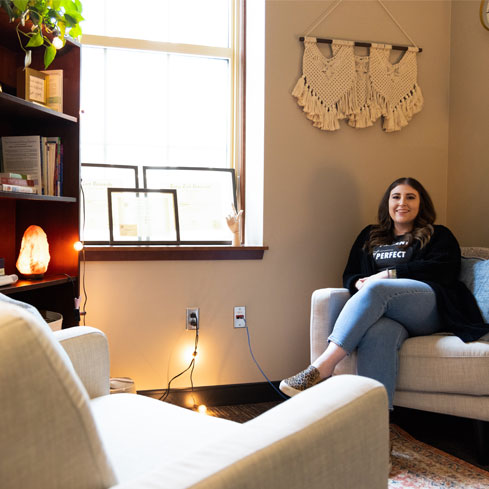
McCay will be able to meet with 20 clients per week during scheduled appointments.
The Jerry S. Rawls College of Business welcomed the 2022-23 academic year with a new staff member dedicated to student success. Elise McCay serves as an embedded counselor for the college. This marks the first time a college within Texas Tech University will have its own embedded therapist available to students, staff and faculty.
“I'm excited to be [at Rawls College],” said McCay, whose office is located within Undergraduate Services Center. “I think students will feel more comfortable seeing someone here in the building than having to walk over to the Student Counseling Center (SCC).”
The new embedded counselor position is one that Adrienne Carnes, senior director of the Undergraduate Services Center, has been eagerly waiting for since 2020 and the COVID pandemic.
“Seeing our students struggle mentally and not being able access to services was hard,” said Carnes. “It took a toll on every single person in my office.”
At that time, the Student Counseling Center (SCC) was overwhelmed with patients and local Lubbock counselors were also not accepting new patients. As a result, Carnes and her staff often found themselves serving as a listening ear to students, but Carnes knew more was needed.
“I am not sure [McCay] understands how much we needed her as a college,” said Carnes. “Having Elise is everything.”
McCay, who began settling into her new role at Rawls College in early May, became a therapist to help people. Coming from a family with a history of addiction and mental health concerns, McCay wanted to be the help her family often needed but did not receive.
“Having that personal experience helped motivate me to go into this work,” said McCay.
Through her work as a therapist, McCay does not just focus on the client as an individual but tries to help them understand the ways and impacts different systems and external factors can have on their mental health.
“I believe change occurs when we include multiple systems,” said McCay. “If we consider it's not just the family or individuals, but the culture around the person – the college, Texas Tech, Lubbock, their hometown, and so forth – we can see the systems that impact a person. I'm not just thinking of a client as an individual, but also the culture that person was raised in and experienced.”
McCay will hold scheduled therapy sessions throughout the week and walk-in office hours on Wednesdays 4-5 p.m. and Fridays 11 a.m.-2 p.m.
Scheduled sessions with McCay will be about 50 minutes long. Before scheduling an appointment with McCay, students will have to go through the SCC's triage protocol and will then schedule future appointments with McCay through the SCC's scheduler. McCay will have enough sessions planned to accommodate 20 clients each week.
While McCay is consistently busy, she encourages students in crisis or students with a high need to schedule an appointment, even if her schedule fills up. Even if they can't meet with her, there are other therapists in the SCC's scheduler they could meet with.
McCay sees her office hours as an opportunity for students to receive quick information about various topics.
“Let's say a student is dealing with test anxiety and want to know some coping skills or maybe they have some questions about counseling itself, those would be perfect for office hours,” said McCay.
Above all else, McCay wants students to understand that they are not alone in their struggles.
“The person sitting next to them in class is probably thinking something similar to what they are. I want students to know that connection is going to be the most important thing for their mental health and their well-being. I want students to know that it's ok to create balance in their life. My hope is to help offer that and encourage that.”
A big part of her encouragement can be seen in the aesthetic of her office. McCay's desk occupies the smallest of spaces along the front wall. In the center stand two cushioned oversized chairs. The lighting is dim and peaceful, with no harsh fluorescent bulbs in sight.
“As you can tell, I try to make my office not so officey,” said McCay. “My goal was to make it comfortable. I want students to feel welcome and safe in here.”
While students may be her primary concern, McCay also wants Rawls College faculty and staff to know she is also available to them.
“If a faculty or staff member have a student they're concerned about, they can come and talk with me,” said McCay. “I'm available beyond individual therapy, and I want them to connect with me.”
McCay also said she can visit classes for Question, Persuade, Refer (QPR) training or for in-class seminars on mental health concerns or coping strategies.
No matter who reaches out to McCay, she hopes to serve as a bridge between maintaining mental health and the strong work culture of Rawls College.
“I know there's a culture of working hard in the college of business,” said McCay, “and I think doing therapy in the building can reframe people's thoughts and behaviors in the building. If a student went to SCC, they could potentially compartmentalize their care by saying, ‘OK, I'm going to therapy there and classes here.'”
McCay hopes having discussion of mental health in the same building where students work hard can help create better balance within their lives.
